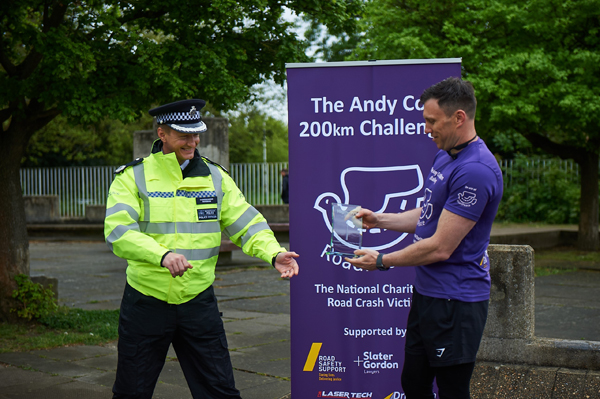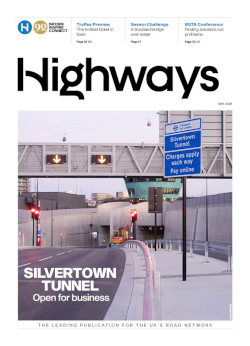A ground breaking Metropolitan Police (Met) and Transport for London (TfL) road safety scheme was honoured at the Highways Awards 2020. Editor Dominic Browne caught up with Andrew Cox, who helped lead the operation for the Met, as he embarked on another epic challenge; this time raising almost £50,000 for RoadPeace, the national charity for road crash victims in the UK.
Saturday morning and a small crowd is gathered in Crystal Palace Park – a TV reporter, a group of traffic officers with their motorbikes stood in a perfect row and a handful of volunteers wearing identical T-shirts. They form an honour guard for the man who is now detective chief superintendent (DCS), head of crime, at Lincolnshire Police, Andrew Cox. He is about to set off on a 200km charity run.
Over nine days, DCS Mr Cox would run from the location where the first pedestrian was killed by a motor car - Bridget Driscoll in 1896 in Crystal Palace - all the way to the RoadPeace Wood at the National Memorial Arboretum, in Staffordshire.

Commander Gordon (left) presenting DCS Cox with his Highways Award: Credit Tiffany Mumford
Highways is in attendance because when DCS Cox was a superintendent at the Met, he led a stunning road safety operation on the A10, which won the Road Safety Scheme of the Year Award in the 2020 Highways Awards.
Identifying the problem
For over 15 years, the A10 in Enfield between the A406 North Circular and the M25 had been a hotspot for illegal street racing, with adjacent car parks used for stunts. Drivers from as far away as Belgium had been involved.
The situation escalated when, in late 2015, as part of the citywide safety camera review, TfL decommissioned several spot cameras along the Enfield stretch of the A10. The investment could not be justified, apparently, as the anti-social driving in this area had not resulted in a significant number of injury collisions.
The local police force in Hertfordshire had the same problem when it came to spending through their safety camera partnership. However, they took a different approach and decided to use funding earmarked for tackling anti-social behaviour to pay for a system of average speed cameras, which went live in July 2016.
As a result, the problem ended in Herts and became concentrated in Enfield. Collisions slowly increased and incidents spread from late night at the weekends to throughout the week.
Research showed that between 01/05/2016 and 30/04/2019 there had been five fatal and 27 serious injury collisions in the area - compared to the previous three years when there was one fatal and seven serious injury collisions.
In April 2019, Kyle Gordon, commander for uniformed operations in the Met including its 2,200 strong roads and transport policing command, was out patrolling with the crews when he saw first-hand the anti-social behaviour and danger caused on the A10.
‘I was shocked’ he tells Highways, ‘and by putting out a Tweet, we found that there was a really strong feeling in the community that this was their road, this was their safety, and they wanted us to do something about it in conjunction with them’.
Commander Gordon asked then superintendent Cox to act – leading to an innovative operation that combined technology, communications, and local knowledge to brilliant effect.
Deploying the right resources
The Met used a strategy of social media engagement that had never been tried before – one that openly communicated aspects of the operation to the local community and those travelling to the area to participate in the anti-social driving. In another first, on-road advertising was employed on the A10 itself to highlight the launch of the operation.
DCS Cox says: ‘Communications was absolutely huge; having the ability to tell people what we are doing, why we are doing it, to win the argument and public debate.’
The engagement paid off and residents were able to provide the police with ‘real-time intelligence’, as well as being encouraged to submit dashcam footage of motoring offences.
‘Eventually it was known the target drivers monitored superintendent Cox’s Twitter account to try and evade detection but that proved largely ineffective for them,’ the Met says.
In a UK first, drones were trialled for traffic enforcement on the road. Although the footage was not the required standard for securing prosecutions, the experience of having such a wide visual cover, which could then help direct units on the ground, was beneficial.
Getting the right results
The impact of the operation was pretty much immediate. In the first year from 1 May 2019 to 30 April 2020, the number of fatal collisions on the route had been brought down to zero, with only four causing serious injury and 42 minor injury collisions - giving a saving of £1.1m, even after accounting for the staffing costs (£126k) and the cameras (£300k). There was a first-year return on resources of £684.333.
I have communicated the #A10 #Enfield speed cameras are fully operational and being used. Perhaps people didn’t believe me? Well... today is the 1 month anniversary of their use and on average ‘186 #speeding drivers per day’ can verify they are working and being enforced. #London pic.twitter.com/o8vni8vHHM
— Andy Cox (@AndyCoxDCS) May 14, 2020
Total enforcement by officers over the period included:
- 2284 total offences reported (1373) for speeding.
- 113 people arrested (52 for drink or drug driving)
- 171 vehicles seized
The average speed cameras were particularly effective once they were up and running on the A10 from April 2020. In the first month of operation the cameras detected 186 offences per day.
Commander Gordon says: ‘We went back to TfL and based on statistics were able to argue the case that we needed these cameras back up again. Average speed is something we are really interested in. We have seen people approaching a point where there is a static camera, they will slow down get through the trap and speed back up again. Actually that is almost more dangerous in some respects because what you have now is erratic behaviour. The average speed cameras undoubtedly have a traffic calming effect.’
Colleagues gathered in Crystal Palace speak highly of DCS Cox and singled out his ability to organise join working with TfL as something particularly noteworthy – suggesting this kind of cross-authority working is a rarity.
DCS Cox says: ‘I pulled together a partnership group, which involved a whole range of different stakeholders including TfL, making it everyone’s issue. We all had one goal: preventing harm on our roads and making people's lives better. Agencies had tackled this problem in isolated ways but they had not collectively come together and the impact of that has been absolutely remarkable.
‘Intelligence-led policing - putting resources in the right place at the right time, tackling the right issue - is obviously very significant and we need to be sharper in doing that so it becomes a problem-solving partnership approach.’
Speaking of future strategies, commander Gordon noted that vehicles will soon ‘have more telematics attached to them' which he suggests could make the job much easier.
He adds: ‘Telematics as with any other sort of intrusive surveillance would be something that requires the highest standards. When it comes to offences such as speeding it would need to be done proportionately. Changes would be needed in the future around that, but as we move forward we are speaking with the Motor Insurers’ Bureau and other partners around what that might look like. Of course if people sign up to a black box in the car they have effectively given their consent.
'We have 1,800 people on average killed on UK roads a year, that's five a day. There is no other area of policing where we would accept that level of harm to our communities. We will look into it; we have some hurdles to overcome in terms of proportionality but we believe we need to exploit everything we can to people safe on our roads.’
After receiving his award and making a gracious speech, DCS Cox tells Highways: ‘It feels absolutely prestigious. It is a recognition of what was an amazing piece of work by everyone connected with it.'’
He is then cheered off on his run, which would raise nearly £50,000 for RoadPeace and counting. You can donate here.
Victoria Lebrec, head of policy campaigns and communications at RoadPeace, explains where the money will go: ‘We exist to do two things; to support crash victims but equally to campaign to end road danger and improve justice for crash victims. The biggest issue in terms of justice stems from collision investigation.
'For instance, a murder investigation has a lot more resources going into it than a fatal car crash. All of the problems in the justice system stem from that ultimately.'
Ms Lebrec adds: ‘We will be launching a campaign on collision investigation a bit later this year; that will be around trying to get best practice and minimum standards for fatal and serious injury investigations agreed. There are loads of problems with the contributory factors recorded in the official data, particularly to do with speeding.'
The Department for Transport (DfT) has reviewed the STATS19 system, which records road traffic collision data, and has set out some recommendations for further feedback.
The data is recorded mainly by the police, but also the public through online self-reporting.
PACTS suggested that more accurate data on road casualties should be a priority and disagreed with the DfT’s proposal ‘that the scope of STATS19 remain unchanged as initial judgement of the officer at the scene’.
Met sources tell Highways their research suggests many more crashes should have speeding as a contributory factor.
New technologies and community collaboration are providing new ways to save lives on roads, as DCS Cox demonstrated so well. However, Commander Gordon sees the permanent solution based in engineering: ‘Policing cannot solve the problem of speeding.
'Engineering out a problem prevents it in the first place. The job of policing is to create the environment in which people can innovate and create these longer-term solutions. To your readers - it is entirely down to you. Engineer out the problems for us and we may not need as many police officers focusing on road safety and we turn them to other really important issues for the community.’





